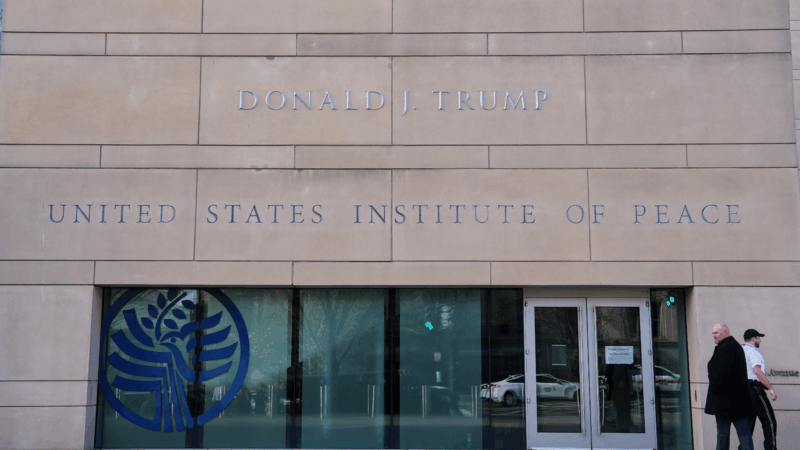How Trump is decimating federal employee unions one step at a time
Sharda Fornnarino got the news in early August.
The Department of Veterans Affairs was ending nearly all of its collective bargaining agreements. The agency gave labor unions just days to get out of federal buildings.
“We went in on the weekend, and we emptied our office space,” says Fornnarino, an outpatient surgery nurse at the Rocky Mountain Regional VA Medical Center outside Denver, where she’s also local director for National Nurses United.
Federal employees have had the right to join unions and collectively bargain over working conditions since the 1960s. Unlike private sector workers, government employees cannot negotiate wages or strike. But through collective bargaining, they do help shape disciplinary procedures, parental leave policies, how overtime is managed and much more.
Giving workers a say in workplace policies, the thinking goes, leads to less friction in the workplace and more effective government.
But President Trump has abandoned that idea. Instead, he’s argued that federal employee unions pose a danger to the country. In March, he issued an executive order ending collective bargaining rights for more than one million federal workers at about 20 federal agencies. Almost immediately, many agencies halted automatic deductions of union dues from employee paychecks, cutting off a critical source of cash flow to the unions. Just ahead of Labor Day, Trump issued a new executive order, adding about a half dozen agencies to the list.
Unions have filed lawsuits, alleging Trump is retaliating against them for opposing parts of his agenda. Lower courts temporarily halted the March order; the government appealed.
Two appeals courts then said the Trump administration could move forward while litigation continues, citing the president’s unique responsibility for protecting national security. In their rulings, the judges noted that the Trump administration had told agencies not to terminate collective bargaining agreements while litigation was pending.
But last month, the administration sent agencies updated guidance, telling them they could go ahead with terminating most union contracts — just not those with the National Treasury Employees Union, due to ongoing litigation. To date, nine agencies have canceled contracts, according to the American Federation of Government Employees.
In late August, a judge on the 9th Circuit Court of Appeals called for a vote on whether the case should be reheard en banc, by a panel of 11 judges. That vote could happen this month.
“I have hope that this will be reversed,” says Fornnarino, while acknowledging that for now, their union protections are gone.
Disputes over time well spent

As an elected union representative, Fornnarino spent time advocating for more training for nurses, particularly those who are floated to different departments, and enhanced safety on the job.
“We were able to put in some protections at their nursing station, increase VA police presence in both the emergency room and the psych unit,” she says.
Fornnarino says the changes have benefited both nurses and the veterans they serve. But the VA sees it differently. The agency noted that last year, bargaining unit employees like Fornnarino spent 750,000 hours of taxpayer-funded time on union activities.
“With no collective bargaining obligations, those hours can now be used to serve Veterans instead of union bosses,” the VA said in a press release announcing the termination of the contract.
Fornnarino scoffs at that suggestion. “Truly, I feel like that’s kind of propaganda,” she says.

National security concerns applied unevenly
In his March and August executive orders, Trump leans on a provision in federal law that gives him authority to end collective bargaining rights at agencies that have national security as a primary function. Past presidents have used that authority sparingly. Trump is applying it to a broad swath of agencies, including the Environmental Protection Agency, the Justice Department, the National Weather Service and the U.S. Agency for Global Media, which oversees the embattled Voice of America.
The president’s rationale is that it hurts national security when unions are able to obstruct management. In a “fact sheet” issued alongside the March executive order, the White House cited the many legal challenges unions have brought. “Certain Federal unions have declared war on President Trump’s agenda,” the document said.
Notably, the executive order excludes agencies that have supported him, including those representing law enforcement and Customs and Border Protection employees.
That’s especially galling to Agriculture Department employee Cole Gandy, who trains CBP workers stationed at ports of entry on how to inspect agricultural imports for pests.
“They have to know how to find the bugs, how to collect them, how to submit them for identification to somebody else,” says Gandy, who’s also president of the National Association of Agriculture Employees.
Those CBP employees still have their union rights while Gandy’s members at NAAE, including the ones who identify those bugs found at the ports, do not.
In fact, they all used to be part of the same union, but the inspectors at the ports were spun off after the September 11 attacks, because their role was deemed essential to national security.
“They’re the first line of defense against terrorism in the United States,” Gandy says.
NAAE and other unions have pointed out these inconsistencies in their lawsuits. While litigation continues, Gandy has tried to assure members that this isn’t the end.
“We’re going to fight to be a union until we can’t anymore,” Gandy says.

Fears of a brain drain
Across the federal government, some workers aren’t waiting around to see what happens. They’re quitting now, having decided a government job just isn’t worth it anymore. Many workers fear with unions gone, they won’t have a say in matters such as telework or family leave policies that make a difference to their quality of life.
“Although they came to the federal government because of their passion for public service, they also came because of the flexibility of the government, and those flexibilities are just being wiped away,” says Anthony Lee, a longtime Food and Drug Administration employee who’s also president of NTEU Chapter 282, representing some 9,000 FDA employees across the Mid Atlantic.
Although the FDA has not yet terminated the union’s contract, it has ordered the union to pack up its offices.
Lee says the government is losing chemists, toxicologists, engineers and others who ensure drugs and medical devices are safe and effective and food ingredients aren’t poisonous.
“It is already, in my view, harming the public because we’re losing that institutional knowledge. We’re losing that subject matter expertise,” Lee says. “As much as the current administration thinks that everyone is just quickly replaceable, they’re not.”
Transcript:
MICHEL MARTIN, HOST:
With Labor Day approaching, unions representing federal workers are in a fight for survival. On Thursday, President Trump issued a new executive order stripping additional federal workers of their union rights, including workers at NASA and the National Weather Service. This comes after other agencies, including HHS and the VA, have terminated union contracts. President Trump says it’s necessary to protect national security. The unions contend it’s about something else. NPR’s Andrea Hsu reports.
ANDREA HSU, BYLINE: Early this month, Sharda Fornnarino got the news the Department of Veterans Affairs was ending nearly all of its collective bargaining agreements. Those are contracts that spell out things like disciplinary procedures, parental leave policies, how overtime is managed and much more. Not only are those agreements now void, the unions were told to clear out of federal buildings.
SHARDA FORNNARINO: We went in on the weekend and we emptied our office space.
HSU: Fornnarino works at the Denver VA. She’s an outpatient surgery nurse and local director for the union National Nurses United. Since the 1960s, federal employees have had the right to join unions and collectively bargain over working conditions. The idea is that giving workers a say in workplace policies leads to more effective government. As a union rep, Fornnarino has spent time advocating for things like training for nurses who are floated to different departments and enhanced safety on the job.
FORNNARINO: We were able to put in some protections at their nursing station, increase VA police presence in both the emergency room and the psych unit.
HSU: Which, she says, benefits both the nurses and the veterans they serve. But the VA sees it differently. The agency noted that last year, employees like Fornnarino spent 750,000 hours of taxpayer-funded time on union activities. In a press release, the VA said, quote, “those hours can now be used to serve veterans instead of union bosses.” Fornnarino scoffs at that suggestion.
FORNNARINO: I think that’s just – truly, I feel like that’s kind of propaganda.
HSU: Behind all of this is Trump’s executive order ending collective bargaining rights at agencies he says have national security as a primary function. The president’s rationale is that it hurts national security when unions are able to obstruct management. But the executive order doesn’t apply to all federal employee unions. It targets those that have challenged him in court over things like mass layoffs and leaves unions that support him alone. That includes unions representing law enforcement, as well as Customs and Border Protection employees. Even though…
COLE GANDY: They’re the first line of defense against terrorism in the United States.
HSU: Cole Gandy doesn’t work for Customs and Border Protection. Gandy works at the Agriculture Department and leads a union that just lost its contract there. But Gandy’s day job is working with Customs and Border Protection inspectors, training them on how to stop pests from entering the country.
GANDY: They have to know how to find the bugs, how to collect them, how to submit them for identification to somebody else.
HSU: That somebody else being an agriculture employee who no longer has union rights. Gandy’s union and others have pointed out these inconsistencies in multiple lawsuits. They’ve been trying to convince the courts that Trump’s attack on unions has nothing to do with national security, that it’s retaliation, pure and simple. But two appeals courts have so far ruled that Trump can move forward while litigation continues. Judges cited his unique responsibility for safeguarding national security. Gandy has tried to assure members this isn’t the end.
GANDY: We’re going to fight to be a union until we can’t anymore.
HSU: But across the federal government, some workers aren’t waiting around to see what happens. They’re quitting now, having decided a government job just isn’t worth it anymore.
Andrea Hsu, NPR News.
(SOUNDBITE OF DIEGO EVORA AND SNAAP’S “AFTERNOON”)
Iran and the U.S. lean into gunboat diplomacy as nuclear talks hang in balance
Iran and the United States leaned into gunboat diplomacy Thursday, with Tehran holding drills with Russia and the Americans bringing another aircraft carrier closer to the Mideast.
José María Balcázar becomes Peru’s eighth president in a decade
José María Balcázar has become Peru's new interim president, replacing another interim leader who was removed over corruption allegations just four months into his term.
Trump gathers members of Board of Peace for first meeting, with some U.S. allies wary
President Donald Trump will gather Thursday with representatives from more than two dozen countries that have joined his Board of Peace, for a meeting that will focus on the reconstruction of Gaza.
With a win over Sweden, the U.S. men’s hockey team will play for an Olympic medal
A thrilling overtime goal by defenseman Quinn Hughes puts Team USA through to a semifinal game against Slovakia. On the other side of the bracket, Canada had its own close call, but moves on to face Finland.
Zuckerberg grilled about Meta’s strategy to target ‘teens’ and ‘tweens’
The billionaire tech mogul's testimony was part of a landmark social media addiction trial in Los Angeles. The jury's verdict in the case could shape how some 1,600 other pending cases from families and school districts are resolved.
The Trump administration is increasingly trying to criminalize observing ICE
ICE officers often tell people tracking and watching them that they are breaking federal law in doing so, but legal experts say the vast majority of observers are exercising their constitutional rights.







